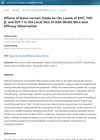 January 2017 in “Cogent Medicine”
January 2017 in “Cogent Medicine” Extracts improve hair growth in alopecia.
 12 citations,
May 2019 in “Aesthetic Surgery Journal”
12 citations,
May 2019 in “Aesthetic Surgery Journal” Platelet-Rich Plasma and stem cell therapy can increase hair count and density, but the best method for preparation and treatment still needs to be determined.
 April 2024 in “Clinical, cosmetic and investigational dermatology”
April 2024 in “Clinical, cosmetic and investigational dermatology” Salvianolic Acid B helps hair grow by reducing cell stress and increasing blood flow to hair follicles.
 February 2024 in “Drug Delivery and Translational Research”
February 2024 in “Drug Delivery and Translational Research” A new liposomal formulation improves drug delivery and hair growth for treating hair loss without causing skin irritation.
 12 citations,
September 2018 in “Journal of Drug Delivery Science and Technology”
12 citations,
September 2018 in “Journal of Drug Delivery Science and Technology” The silk fibroin hydrogel with FGF-2-liposome can potentially treat hair loss in mice.
2 citations,
January 2016 in “Advanced biomedical research” The hair wax with propolis and Eruca sativa seed oil promotes hair growth effectively.
 19 citations,
May 2016 in “Clinical, cosmetic and investigational dermatology”
19 citations,
May 2016 in “Clinical, cosmetic and investigational dermatology” FGF-2&D/P nanoparticles can help treat hair loss.

Hair aging leads to color loss and reduced density, and dermatologists are key in treating it to improve quality of life.
 July 2024 in “Pharmaceutics”
July 2024 in “Pharmaceutics” The new hydrogel treatment promotes faster hair growth and better skin health for hair loss.
64 citations,
October 1998 in “Acta dermato-venereologica” Grape seed proanthocyanidins can promote hair growth.
 13 citations,
May 2021 in “Plants”
13 citations,
May 2021 in “Plants” The leaf extract of Leea indica may reduce inflammation, dissolve blood clots, and promote hair growth.
 5 citations,
September 2020 in “Molecules”
5 citations,
September 2020 in “Molecules” Extracts from three Polynesian plants were found to promote hair growth by affecting cell growth and gene expression related to hair.

The herbal shampoo effectively reduces dandruff and hair fall.
 14 citations,
August 2019 in “Journal of Dermatological Treatment”
14 citations,
August 2019 in “Journal of Dermatological Treatment” 10% minoxidil solution better promotes hair growth and reduces hair loss without significant side effects.
 31 citations,
May 2008 in “Drug Discovery Today: Disease Mechanisms”
31 citations,
May 2008 in “Drug Discovery Today: Disease Mechanisms” Different hair growth problems are caused by genetic issues or changes in hair growth cycles, and new treatments are being developed.
 9 citations,
November 2018 in “Drug Discovery Today”
9 citations,
November 2018 in “Drug Discovery Today” Using skin stem cells and certain molecules might lead to scar-free skin healing.
 5 citations,
October 2022 in “Cosmetics”
5 citations,
October 2022 in “Cosmetics” Cell-based models help test if cosmetic ingredients really work for hair growth and skin health.
December 2014 in “대한피부미용학회지” Natural hair-loss preventers from plants and herbs are becoming popular due to fewer side effects and added benefits.
 14 citations,
September 2020 in “Clinical, cosmetic and investigational dermatology”
14 citations,
September 2020 in “Clinical, cosmetic and investigational dermatology” The hair serum significantly improved hair growth and reduced hair fall without causing any skin issues.
 10 citations,
May 2019 in “BMC Complementary and Alternative Medicine”
10 citations,
May 2019 in “BMC Complementary and Alternative Medicine” The extract from Bacillus/Trapa japonica fruit helps increase hair growth and could be a potential treatment for hair loss.
 102 citations,
February 2008 in “The FASEB Journal”
102 citations,
February 2008 in “The FASEB Journal” One minoxidil-sensitive potassium channel exists in human hair follicles.
1 citations,
October 2023 in “Animals” A small dose of Platycladus orientalis leaf extract improves raccoon dogs' growth and health, but higher doses can be harmful.
 April 2023 in “Biomedical Journal of Scientific and Technical Research”
April 2023 in “Biomedical Journal of Scientific and Technical Research” Indian head cactus extract may help hair grow by boosting important cell activity and gene expression.
 January 2025 in “Journal of Contemporary Medical Practice”
January 2025 in “Journal of Contemporary Medical Practice” Nano-cerium oxide may help treat hair loss by improving hair growth and reducing certain skin proteins.
 24 citations,
January 2006 in “Skin Pharmacology and Physiology”
24 citations,
January 2006 in “Skin Pharmacology and Physiology” Finasteride reverses early hair loss and promotes growth.
 14 citations,
October 2019 in “Journal of Cellular Physiology”
14 citations,
October 2019 in “Journal of Cellular Physiology” Micrografts promote hair growth in androgenetic alopecia treatment.
 17 citations,
January 2013 in “Our Dermatology Online”
17 citations,
January 2013 in “Our Dermatology Online” Dutasteride mesotherapy helps treat male hair loss but may harm sperm and sexual function.
 5 citations,
May 2022 in “Biomedicines”
5 citations,
May 2022 in “Biomedicines” Botryococcus terribilis and its compounds may promote hair growth and improve hair health.
 2 citations,
May 2023 in “Marine Drugs”
2 citations,
May 2023 in “Marine Drugs” Marine-derived saccharides may help reduce aging effects on skin and hair by promoting cell growth and collagen production.
Avicennia Marina extract and avicequinone C can reduce hair loss hormone production and increase hair growth factors, suggesting they could be used to treat androgenic alopecia.

























